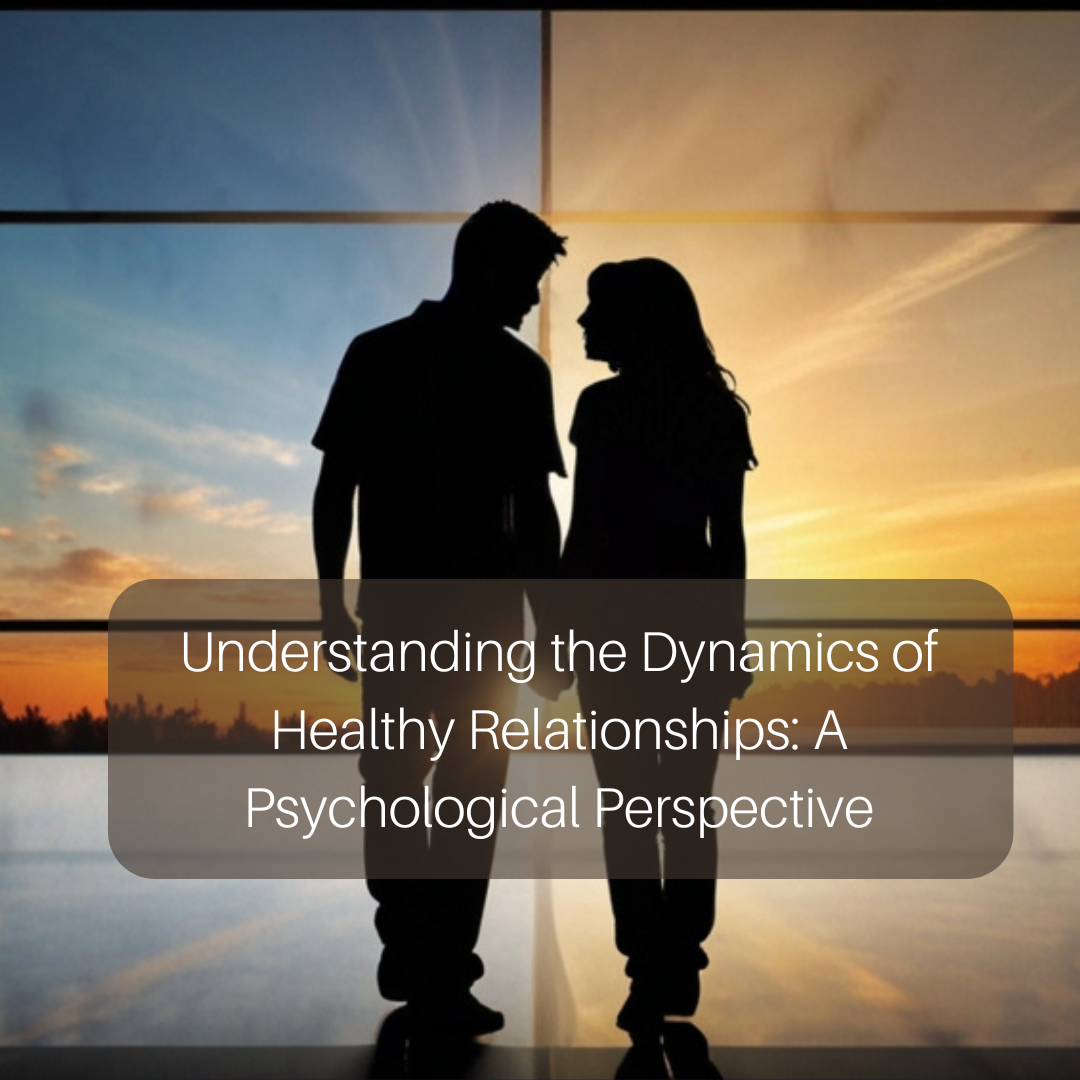Some links in this article may be affiliate links, meaning we may earn a small commission if you make a purchase through them.
Introduction:
Healthy relationships are the cornerstone of a fulfilling life, providing support, companionship, and emotional connection. From a psychological perspective, these relationships are characterized by mutual respect, effective communication, and a strong foundation of trust. In this comprehensive guide, we will delve deep into the intricacies of healthy relationships, exploring key concepts, practical strategies, and real-life examples to help you nurture and sustain fulfilling connections with your partner.
Communication in Healthy Relationships:
Effective communication is the bedrock of any healthy relationship. It involves not only expressing oneself clearly but also listening actively to your partner’s thoughts and feelings. Studies conducted by renowned relationship experts John and Julie Gottman at the Gottman institute shed light on the profound impact of communication on relationship satisfaction and longevity. Through decades of research, the Gottmans identified specific communication patterns, such as criticism, defensiveness, contempt, and stonewalling, that can predict relationship failure with startling accuracy. Conversely, they found that couples who practice healthy communication habits, such as expressing appreciation, empathy, and active listening, tend to have stronger and more resilient relationships.
Studies have shown that couples who engage in open and honest communication tend to experience greater relationship satisfaction and intimacy. Research published in the Journal of Marriage and Family found that couples who regularly express appreciation and gratitude for each other report higher levels of marital happiness and lower rates of divorce. Additionally, a study published in the Journal of Communication revealed that active listening, characterized by genuine interest and empathy, is associated with higher levels of relationship quality and emotional intimacy.
Practical Tips:
To cultivate effective communication in your relationship, consider incorporating the following strategies:
- Practice active listening: Focus on understanding your partner’s perspective without judgment or interruption.
- Use “I” statements: Express your thoughts and feelings using language that reflects your own experiences rather than blaming or criticizing your partner.
- Express appreciation: Take time to acknowledge and thank your partner for their contributions and support.
- Validate emotions: Show empathy and understanding towards your partner’s feelings, even if you don’t necessarily agree with them.
- Seek professional help: If communication challenges persist, consider seeking couples therapy or counseling to learn new skills and address underlying issues.
Trust and Transparency:
Trust is the foundation upon which healthy relationships are built. Transparency, honesty, and consistency are essential components of trust. Research published in the Journal of Personality and Social Psychology underscores the critical importance of trust in relationship dynamics. The study highlights that trust serves as a fundamental pillar of relationship satisfaction and longevity, shaping the way partners perceive each other and interact within the relationship. Couples who feel confident in their partner’s honesty and reliability are more likely to experience greater relationship stability and overall well-being.
Studies have shown that trust is intricately linked to relationship satisfaction and stability. Research published in the Journal of Marriage and Family suggests that couples who perceive their partners as trustworthy report higher levels of relationship quality and lower rates of conflict and dissatisfaction. Additionally, a study published in the Journal of Social and Personal Relationships found that transparency and honesty contribute significantly to perceptions of trustworthiness in relationships.
Practical Tips:
To cultivate trust and transparency in your relationship, consider implementing the following strategies:
- Be honest and consistent in your words and actions.
- Practice active listening and empathy to foster understanding and connection.
- Communicate openly about your thoughts, feelings, and concerns.
- Honor your commitments and demonstrate reliability in your behavior.
- Address any breaches of trust promptly and work together to rebuild trust through transparency and accountability.
Boundaries and Respect:
Setting and respecting boundaries is crucial for maintaining individual autonomy and fostering mutual respect in relationships. Extensive research, including studies published in journals such as the Journal of Family Psychology and the Journal of Social and Personal Relationships, highlights the importance of boundaries in relationship dynamics. These studies underscore that clear boundaries contribute to relationship satisfaction, emotional intimacy, and conflict resolution. Partners who establish and respect boundaries report higher levels of trust, security, and mutual respect within their relationship.
Research conducted by psychologists Dr. Brene Brown and Dr. John Gottman underscores the importance of boundaries in fostering healthy relationships. Dr. Brown emphasizes that boundaries are essential for establishing trust and emotional safety, while Dr. Gottman’s studies highlight the correlation between boundary violations and relationship dissatisfaction. These findings underscore the significance of setting and respecting boundaries to nurture strong, fulfilling relationships.
Practical Tips:
To establish and respect boundaries in your relationship, consider implementing the following strategies:
- Communicate openly and honestly about your needs, preferences, and boundaries.
- Be receptive to your partner’s boundaries and validate their feelings and perspectives.
- Set clear, specific boundaries around areas such as personal space, time, and communication.
- Practice empathy and understanding when navigating boundary-related conflicts or disagreements.
- Prioritize mutual respect and compromise to maintain harmony and trust within the relationship.
Conflict Resolution Skills:
Conflict is inevitable in any relationship, but how it is managed can make all the difference. Healthy couples employ constructive conflict resolution skills, such as active listening, empathy, and compromise, to address disagreements and find mutually satisfactory solutions. Research conducted by renowned psychologist Dr. John Gottman provides valuable insights into effective conflict resolution strategies. His studies, published in journals such as the Journal of Marriage and Family, have identified four primary conflict resolution styles: validating, volatile, conflict-avoidant, and hostile. Dr. Gottman’s research highlights that couples who employ a validating style, characterized by open communication, empathy, and compromise, experience greater relationship satisfaction and longevity.
Dr. Gottman’s research underscores the importance of constructive conflict resolution in fostering healthy relationships. His studies reveal that couples who engage in open dialogue, validate each other’s emotions, and seek compromise exhibit higher levels of relationship satisfaction and intimacy. By contrast, couples who resort to hostile or avoidant conflict resolution styles often experience heightened conflict and dissatisfaction in their relationships.
Practical Tips:
To enhance conflict resolution skills in your relationship, consider implementing the following strategies:
- Practice active listening by fully engaging with your partner’s perspective and emotions.
- Cultivate empathy and understanding by validating your partner’s feelings and experiences.
- Focus on finding mutually satisfactory solutions through compromise and negotiation.
- Take breaks when emotions run high to prevent escalation and promote constructive dialogue.
- Seek professional guidance or counseling if recurring conflicts persist or become overwhelming.
Intimacy and Connection:
Intimacy goes beyond physical closeness; it encompasses emotional, intellectual, and spiritual connection between partners. Cultivating intimacy involves sharing experiences, expressing vulnerability, and nurturing the bond that binds partners together. Studies conducted by relationship experts like Dr. Sue Johnson shed light on the significance of emotional intimacy in fostering lasting and fulfilling relationships. Research published in journals such as the Journal of Family Psychology underscores the correlation between emotional intimacy and relationship satisfaction, highlighting its role in promoting trust, empathy, and mutual understanding between partners.
Consider the journey of Emily and Alex, a couple committed to nurturing emotional intimacy in their relationship. Through heartfelt conversations, shared experiences, and acts of vulnerability, they deepen their emotional connection and strengthen their bond. When faced with challenges, they lean on each other for support, knowing that their emotional intimacy provides a solid foundation for navigating life’s ups and downs.
Practical Tips:
To enhance intimacy and connection in your relationship, consider implementing the following strategies:
- Make time for meaningful conversations where you can share your thoughts, feelings, and experiences openly and honestly.
- Practice active listening and empathy, seeking to understand your partner’s perspective and validate their emotions.
- Engage in activities that promote emotional connection, such as shared hobbies, adventures, or rituals that hold personal significance.
- Express affection and appreciation regularly through gestures, words, and actions that reinforce your love and commitment to each other.
- Prioritize intimacy in all its forms, including physical, emotional, intellectual, and spiritual connection, to create a well-rounded and deeply fulfilling relationship.
Handling Differences and Compromise:
Every relationship faces differences and disagreements, but healthy couples approach these challenges with an attitude of mutual respect and a willingness to compromise. Finding common ground and seeking solutions that honor both partners’ needs fosters harmony and understanding. Studies conducted by relationship experts like Dr. Dan Wile highlight the importance of compromise in maintaining balance and harmony in relationships. Research published in journals such as the Journal of Marriage and Family underscores the correlation between effective conflict resolution strategies, including compromise, and relationship satisfaction. These findings emphasize the role of compromise in fostering mutual respect and understanding between partners.
In everyday life, couples often encounter differences in preferences, values, and priorities. Take the example of Mark and Lisa, who faced conflicting opinions on where to spend their vacation. While Mark envisioned an adventurous trip, Lisa preferred a relaxing beach getaway. By actively listening to each other’s perspectives, discussing their preferences, and exploring alternative options, they ultimately found a compromise that satisfied both of their desires and strengthened their bond.
Practical Tips:
To navigate differences and compromise effectively in your relationship, consider implementing the following strategies:
- Foster open communication by expressing your thoughts, feelings, and preferences honestly and respectfully.
- Practice active listening and empathy, seeking to understand your partner’s perspective and underlying needs.
- Explore creative solutions that allow for flexibility and compromise, brainstorming options that accommodate both partners’ preferences and priorities.
- Maintain a spirit of goodwill and cooperation, prioritizing the health and happiness of the relationship above individual desires.
- Celebrate successful compromises as opportunities for growth and strengthened connection, recognizing the value of mutual understanding and collaboration.
Red Flags to Watch Out For:
While every relationship has its ups and downs, certain behaviors may indicate deeper issues. Red flags such as manipulation, control, or lack of respect should not be ignored and may require professional intervention or reevaluation of the relationship. Experts like Dr. Lundy Bancroft, a renowned authority on abusive relationships, provide valuable insights into recognizing and addressing red flags in relationships. Dr. Bancroft’s research and clinical experience underscore the warning signs of abusive behavior, including patterns of manipulation, gaslighting, and coercive control. His work emphasizes the importance of seeking professional help and support when navigating potentially harmful relationship dynamics.
Consider the case of Emma and David, a couple whose relationship exhibited concerning red flags. David frequently criticized and belittled Emma, undermining her self-esteem and autonomy. Over time, his behavior escalated to include controlling tactics, such as monitoring her whereabouts and isolating her from friends and family. With the support of a therapist, Emma recognized these red flags as signs of emotional abuse and took steps to prioritize her safety and well-being.
Practical Tips:
To identify and address red flags in your relationship, consider the following strategies:
- Trust your instincts and pay attention to your feelings about the relationship.
- Educate yourself about healthy relationship dynamics and warning signs of abuse.
- Establish and maintain clear boundaries, communicating your needs and expectations openly.
- Seek support from a therapist, counselor, or support group if you have concerns about your relationship.
- Take action to prioritize your safety and well-being, whether it involves setting boundaries, seeking professional help, or ending the relationship if necessary.
Cultivating Gratitude and Appreciation:
Expressing gratitude and appreciation for each other’s contributions to the relationship fosters a sense of connection and mutual respect. Taking the time to acknowledge and celebrate each other’s efforts can strengthen the bond and deepen emotional intimacy. Studies conducted by leading psychologists, including Dr. Robert Emmons, have highlighted the profound impact of gratitude on relationship satisfaction and well-being. Research published in journals such as the Journal of Happiness Studies and the Journal of Personality and Social Psychology demonstrates that expressing gratitude fosters positive emotions, strengthens social bonds, and enhances overall relationship quality.
Dr. Robert Emmons, a prominent expert in the field of positive psychology, has extensively researched the benefits of gratitude in various domains, including relationships. Dr. Emmons’ studies emphasize the role of gratitude in promoting empathy, generosity, and emotional connection between partners. His work underscores the importance of cultivating a grateful mindset to nurture healthy and fulfilling relationships.
Consider the case of Jack and Emily, a couple who incorporated gratitude practices into their relationship. Each evening, they took turns expressing appreciation for specific actions or qualities they admired in each other. Over time, this simple ritual strengthened their bond and deepened their appreciation for one another’s contributions to the relationship. Both Jack and Emily reported feeling more connected and valued, enhancing their overall relationship satisfaction.
Practical Tips:
To cultivate gratitude and appreciation in your relationship, consider the following strategies:
- Practice mindful awareness of your partner’s positive traits and actions.
- Express gratitude and appreciation verbally or through written notes, gestures, or small acts of kindness.
- Create rituals or routines that incorporate gratitude into your daily interactions.
- Reflect on the ways your partner enhances your life and relationship, and communicate your appreciation openly.
- Cultivate a grateful mindset by focusing on the positives in your relationship, even during challenging times.
Balancing Independence and Togetherness:
Healthy relationships strike a delicate balance between independence and togetherness. While maintaining individual identities and pursuing personal interests is important, partners also prioritize quality time together, shared experiences, and mutual goals. Studies in the field of psychology and relationship science have examined the dynamics of autonomy and intimacy in relationships. Research published in journals such as the Journal of Marriage and Family and the Journal of Personality and Social Psychology suggests that couples who maintain a healthy balance between independence and togetherness experience greater relationship satisfaction and longevity.
Dr. Esther Perel, a prominent couples therapist and bestselling author, emphasizes the importance of reconciling the desire for autonomy with the need for intimacy in relationships. Dr. Perel’s work explores how individuals can cultivate independence within their relationships without sacrificing closeness and connection. She advocates for the integration of autonomy and togetherness as essential components of a thriving partnership.
Consider the case of Sarah and Mark, a couple who navigated the challenge of balancing independence and togetherness in their relationship. Sarah valued her independence and pursued hobbies and interests outside of the relationship, while Mark enjoyed spending quality time together as a couple. Through open communication and mutual respect for each other’s needs, they found a balance that allowed them to maintain their individuality while also fostering a strong sense of partnership.
Real-Life Examples:
In real-life scenarios, individuals can strive to strike a balance between independence and togetherness by:
- Allowing each partner to pursue personal interests and goals.
- Respecting each other’s need for alone time and space.
- Prioritizing quality time together through shared activities and experiences.
- Communicating openly about individual needs and expectations within the relationship.
- Finding creative ways to integrate independence and togetherness into daily life, such as scheduling regular date nights or pursuing joint interests while also maintaining separate hobbies.
Conclusion and Key Takeaways:
In the intricate tapestry of healthy relationships, effective communication, trust, respect, and intimacy form the threads that bind partners together. Through our exploration of key concepts and practical strategies, we’ve uncovered the essential elements that contribute to nurturing and sustaining fulfilling connections with our loved ones.
Communication, as we’ve learned, serves as the cornerstone of healthy relationships, fostering understanding, empathy, and connection between partners. By practicing active listening, expressing appreciation, and validating each other’s emotions, couples can cultivate a strong foundation of communication that withstands the tests of time.
Trust and transparency lay the groundwork for relationship stability and security, allowing partners to feel confident in each other’s honesty and reliability. By honoring boundaries, respecting individual autonomy, and communicating openly, couples can foster a sense of trust that serves as a beacon of strength in times of challenge.
Conflict resolution skills provide the roadmap for navigating disagreements and differences with grace and understanding. By embracing compromise, empathy, and constructive dialogue, couples can transform conflict into an opportunity for growth and deeper connection.
Emotional intimacy and connection enrich the fabric of relationships, weaving together the threads of shared experiences, vulnerability, and mutual support. By prioritizing quality time together, expressing gratitude, and celebrating each other’s contributions, couples can cultivate a bond that transcends the mundane and mundane, creating a sanctuary of love and understanding.
Balancing independence and togetherness requires finesse and understanding, as partners strive to honor their individuality while fostering closeness and connection. By respecting each other’s autonomy, communicating openly, and finding creative ways to integrate independence and togetherness, couples can create a dynamic synergy that fuels their relationship’s growth and vitality.
As we journey through the complexities of healthy relationships, let us remember that the path to fulfillment is paved with patience, compassion, and understanding. By embracing the principles of effective communication, trust, respect, intimacy, and balance, we can cultivate relationships that not only withstand the tests of time but also thrive in the richness of shared love and connection.
Additional Resources:
- “The Seven Principles for Making Marriage Work” by John Gottman, PhD
- “Daring Greatly: How the Courage to Be Vulnerable Transforms the Way We Live, Love, Parent, and Lead” by Brene Brown, PhD
- “Hold Me Tight: Seven Conversations for a Lifetime of Love” by Sue Johnson, PhD
- “The State of Affairs: Rethinking Infidelity” by Esther Perel, MA, LMFT
- “Why Does He Do That?: Inside the Minds of Angry and Controlling Men” by Lundy Bancroft




